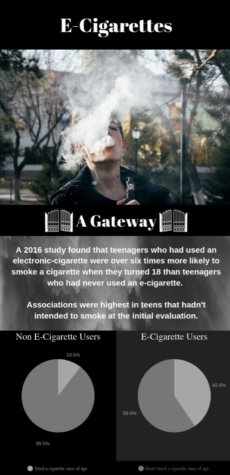Electronic cigarettes, known to most as e-cigarettes, are electronic devices that create aerosols that are inhaled. The aerosols are formed from an “e-liquid” that could contain nicotine and, a usually fruity like, flavor. The Food and Drug Administration classify e-cigarettes as electronic nicotine delivery systems, which are defined as non-combustible tobacco products. There are a lot of misunderstandings about e-cigarette use, and it is important to separate the facts from the fictions of e-cigarettes.
Health Effects
The long-term health effects of e-cigarette use are largely unknown, due to their novelty. The short-term health effects, in contrast, are at least somewhat known. While many make the claim that e-cigarettes are harmless, non-addictive and do not cause any respiratory illnesses, those claims are not supported by the evidence. According to a consensus report done by the National Academies of Sciences, Engineering, and Medicine, “There is conclusive evidence that in addition to nicotine, most e-cigarette products contain and emit numerous potentially toxic substances.” The academy also found that, “There is substantial evidence that e-cigarette use results in symptoms of dependence on e-cigarettes.” The report found that, “There is no available evidence whether or not e-cigarette use is associated with clinical cardiovascular outcomes”.
Another claim that is very commonly made is that the health effects of e-cigarettes are just as, if not more, harmful than traditional cigarette use. Due to the lack of knowledge of the long-term health effects of e-cigarette use, It is impossible to reasonably conclude that e-cigarettes are either more or less harmful than normal cigarettes, but the evidence indicates that the effects of e-cigarettes are less dangerous, at least in the short-term.
A Gateway

A Substitute
While e-cigarettes may be a gateway to smoking, they may also be a tool to quit smoking. According to the aforementioned consensus report,
“Overall, the evidence suggests that while e-cigarettes might cause youth who use them to transition to use of combustible tobacco products, they might also increase adult cessation of combustible tobacco cigarettes.”
Saying that e-cigarettes are either only harmful to people or only helpful for people is inaccurate and their use is a complex issue. Wherever you fall on the debate on e-cigarettes, it is important to be aware of what conclusions are supported by science, and which aren’t.